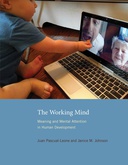Explore

The Working Mind
Juan Pascual-Leone and Janice M. Johnson
2021
0 Ungluers have
Faved this Work
Login to Fave
A general organismic-causal theory that explicates working memory and executive function developmentally, clarifying the nature of human intelligence. In The Working Mind, Juan Pascual-Leone and Janice M. Johnson propose a general organismic-causal theory that explicates working memory and executive function developmentally and by doing so clarifies the nature of human intelligence. Pascual-Leone and Johnson explain “from within” (that is, from a subject's own processing perspective) cognitive developmental stages of growth, describing key causal factors that can account for the emergence of the working mind as a functional totality. Among these factors is a maturationally growing mental attention. After reviewing meaning-driven processes and constructivist knowledge principles that underlie what Pascual-Leone and Johnson term their Theory of Constructive Operators (TCO), they propose the TCO as as a developmental and neuropsychological approach to human cognitive and affective processes and their development. They present a novel method of mental task analysis that generates from-within process models of subjects' attempts to solve specific tasks. They provide an interpretation of brain semiotic processes that deploys TCO in functionally distinct brain locations. Finally, they show how TCO explicates complex human issues including consciousness, the self, the will, motivation, and individual differences, with applications in education, psychotherapy, and cognitive neuropsychology.
This book is included in DOAB.
Why read this book? Have your say.
You must be logged in to comment.
Rights Information
Are you the author or publisher of this work? If so, you can claim it as yours by registering as an Unglue.it rights holder.Downloads
This work has been downloaded 104 times via unglue.it ebook links.
- 104 - pdf (CC BY-NC-ND) at Unglue.it.
Keywords
- abstraction
- accommodation
- affect and emotion processes
- affects a
- automatic inhibition
- automatic or effortless attention
- Biology, Life Sciences
- causal theories
- Child & developmental psychology
- chimpanzees' symbols
- cognitive development
- cognitive neuropsychology
- cognitive versus affective schemes
- Consciousness
- consciousness in infants
- constructivism
- constructivist learning
- developmental stages
- dialectical constructivism
- dialectics
- distal versus proximal object
- emergence of symbolic function
- endogenous
- Epistemology
- equilibration
- executive schemes
- expectancies
- facilitating versus misleading situations
- figurative schemes
- functional invariants
- hierarchical reinforcement learning
- iconic versus indexical function
- intelligence
- Intentionality
- internal field factor
- learning paradox
- Life sciences: general issues
- M-power versus M-demand trade-off
- Mathematics & science
- mediation
- Mental
- mental attention
- mental flow
- mental or effortful attention
- mental processes in infancy
- mental-attention in infancy
- misleading versus facilitating situations
- neoPiagetian theory
- Neurosciences
- object permanence
- operative schemes
- or executive attention
- overdetermination
- Piagetian conservation
- processing complexity
- Psychology
- reality resistances
- reflective abstraction
- resistances
- scheme learning
- Schemes
- schemes or schemas
- Semiotics
- sensorimotor stages
- sensorimotor versus symbolic executives
- signalic versus symbolic function
- signals versus symbols
- Society & Social Sciences
- task analysis of infancy tasks
- task analysis of symbolic processes
- theory of constructive operators
- theory of development
- Theory of Mind
- type-1 versus type-2 thinking
- types of schemes
- working memory
Editions

